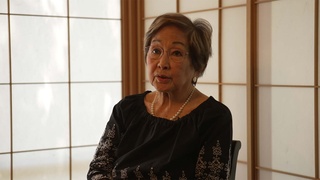Interviews
A story about his mother
But her neighbors, you know, feeling sorry for her, would take her in for a couple of weeks, another neighbor takes her in for a couple of weeks. And after about a month of this a Hawaiian couple came by and inquired, she said, “We heard of this orphaned Japanese, where is she?” And they pointed my mother out, they went up, “Follow us.” and she lived with this Hawaiian family for about a year. And this apparently was the happiest moments of her life.
*I: And she was how old again?
‘Bout four at that time. And she went around barefooted, played with the Hawaiian kids, see from these Japanese plantation camps, she went to live with the Hawaiians, did a lot of swimming and all of that. And she spoke Hawaiian, she loved the Hawaiians, that’s why I am so dedicated to the Hawaiian cause, because my mother always said, “You owe a lot because I owe a lot to the Hawaiians and I can’t do it, but you can.”
*”I” indicates an interviewer.
Date: May 31, 2001
Location: California, US
Contributed by: Watase Media Arts Center, Japanese American National Museum









